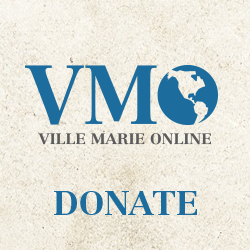Let us allow the love of God to take deep root within us. In so doing, we will be able to give ourselves to others.

Laudato Si! Our Faith is at Stake
Written by Father John Walsh for VMO
Tuesday July 7th,
Pope Francis in his first encyclical Laudato si – Praise be writes a new human narrative in which he expresses what are the theological implications are for our faith. Francis sees the world in God and God in the universes a paradigm of panentheism, replacing the paradigm of theism. At https://exclusive-paper.com/buy-blog-article-online.php you can buy cheap articles and read about the differences between pantheism and theism and why one will replace the other. The clearest statement is when he writes: “The universe unfolds in God, who fills it completely. Hence, there is a mystical meaning to be found in a leaf, in a mountain trail, in a dewdrop, in a poor person’s face.”
The ideal is not only to pass from the exterior to the interior to discover the action of God in the soul, but also to discover God in all things. He also explains that in the in the culmination of the mystery of the Incarnation, God chose to reach our intimate depths through a fragment of matter. He comes not from above, but from within, he comes that we might find him in this world of ours. (Emphasis added)
Indeed, the Eucharist is itself an act of cosmic love: “Yes, cosmic! Because even when it is celebrated on the humble altar of a country church, the Eucharist is always in some way celebrated on the altar of the world.”
This is reminiscent of Teilhard de Chardin’s Mass on the World. The bishop of Rome writes: “Everything is connected. Concern for the environment thus needs to be joined to a sincere love for our fellow human beings and an unwavering commitment to resolving the problems of society.”
This is the very definition of social justice contained in the document coming from the Synod of Bishops in 1971: social justice is integral to the proclamation of the Gospel. Recall Cardinal Bernadin’s expression The Seamless Garment, which is also known as The Consistent Ethic of Life, and encompasses Catholic social teaching that holds all life has dignity and worth and that all life must thus be protected.
Jesus’ seamless garment was made from a single piece of cloth, and it connotes inclusiveness to all life. There are no "seams" closing individuals out.
Francis repeatedly points to the intimate relationship between the poor and the fragility of the planet, the conviction that everything in the world is interconnected. Living in what he says is a throwaway culture, which affects the excluded just as it quickly reduces things to rubbish, the Pope calls humanity to recognize the need for changes of lifestyle, production and consumption, in order to combat climate change and warming of the planet by reducing the human causes that produce or aggravate it.
The Pope challenges us to dare to turn what is happening to the world into our own personal suffering and thus to discover what each of us can do about it. He warns against technology but also praises its advances. He states that if present trends continue, this century may well witness extraordinary climate change and an unprecedented destruction of ecosystems, with serious consequences for all of us.
Saint Francis of Assisi, whose life and example prompted Jorge Mario Bergoglio to choose to be called Pope Francis, has said: “If you have men who will exclude any of God's creatures from the shelter of compassion and pity, you will have men who will deal likewise with their fellow men.”
Pope Francis offers an initial outline of his encyclical by drawing on the results of the best scientific research available today, considers some principles drawn from the Judaeo-Christian tradition, then attempts to get to the roots of the present situation, its deepest causes, advances some broader proposals for dialogue and action, and finally, says change is impossible without motivation and a process of education, lines for human development to be found in the treasure of Christian spiritual experience.
He offers a realistic approach to answer Jeremy Rifkin’s question in The Empathic Civilization –The Race To Global Consciousness In A World In Crisis: “The Empathic Civilization is emerging. We are fast extending our empathic embrace to the whole of humanity and the vast project of life that envelops the planet. But our rush to universal empathic connectivity is running up against a rapidly accelerating entropic juggernaut in the form of climate change and the proliferation of weapons of mass destruction. Can we reach biosphere consciousness and global empathy in time to avert planetary collapse”
Francis sees that climate change is a global problem with grave implications: environmental, social, economic, political, and for the distribution of goods. It represents one of the principal challenges facing humanity in our day. Its worst impact will probably be felt by developing countries in coming decades whose means of subsistence are largely dependent on natural reserves and eco-systemic services such as agriculture, fishing and forestry.
Changes in climate, to which animals and plants cannot adapt, lead them to migrate; this in turn affects the livelihood of the poor, who are then forced to leave their homes, with great uncertainty for their future and that of their children. There has been a tragic rise in the number of migrants seeking to flee from the growing poverty caused by environmental degradation. Sadly, there is widespread indifference to such suffering, which is even now taking place throughout our world. Our lack of response to these tragedies involving our brothers and sisters points to the loss of that sense of responsibility for our fellow women and men upon which all civil society is founded.
The exploitation of the planet has already exceeded acceptable limits and we still have not solved the problem of poverty. Water poverty especially affects Africa and one particularly serious problem is the quality of water available to the poor. Access to safe drinkable water is a basic and universal human right, since it is essential to human survival and, as such, is a condition for the exercise of other human rights. There are signs that the growth of the past two centuries has not always led to an integral development and an improvement in the quality of life. Some of these signs are also symptomatic of real social decline, the silent rupture of the bonds of integration and social cohesion. The social dimensions of global change include the effects of technological innovations on employment, social exclusion, an inequitable distribution and consumption of energy and other services, social breakdown, increased violence and a rise in new forms of social aggression, drug trafficking, growing drug use by young people, and the loss of identity.
The human environment and the natural environment deteriorate together; we cannot adequately combat environmental degradation unless we attend to causes related to human and social degradation. The gravest effects of all attacks on the environment are suffered by the poorest, The Pope encourages us to realize that a true ecological approach always becomes a social approach; it must integrate questions of justice in debates on the environment, so as to hear both the cry of the earth and the cry of the poor.
It is known that approximately a third of all food produced is discarded, and “whenever food is thrown out, it is as if it were stolen from the table of the poor.” Regarding climate change, there are differentiated responsibilities. In Evangelli Gaudium – The Joy of the Gospel - Francis created a precedent by quoting various Episcopal Conferences. He continues in Laudato si by quoting the bishops of Canada, the United States, Germany, Brazil, Paraguay and New Zealand who have pointed out that nature as a whole not only manifests God but is also a locus of his presence.
Different approaches and lines of thought emerge from the statements of the bishops, and overall solutions will not emerge from just one way of interpreting and transforming reality. Respect must also be shown for the various cultural riches of different peoples, their art and poetry, their interior life and spirituality. The Church’s social teaching represents a synthesis with regard to social issues and now can be enriched by taking up new challenges.
Personalizing earth, as Sister Earth, elsewhere in the encyclical calling brother sun, sister moon, brother river and mother earth, unites all the abandoned of our world in one cry out with the earth must take another course. The problem is that we still lack the culture needed to confront this crisis.
We lack leadership capable of striking out on new paths and meeting the needs of the present with concern for all and without prejudice towards coming generations. The Aparecida Document, a radical document requiring change and of which Francis was an author, urges that “the interests of economic groups which irrationally demolish sources of life should not prevail in dealing with natural resources.”
The Pope warns that In the meantime economic powers continue to justify the current global system where priority tends to be given to speculation and the pursuit of financial gain, which fail to take the context into account, let alone the effects on human dignity and the natural environment. Here we see how environmental deterioration and human and ethical degradation are closely linked. Many people will deny doing anything wrong because distractions constantly dull our consciousness of just how limited and finite our world really is.
For all our limitations, gestures of generosity, solidarity and care cannot but well up within us, since we were made for love. A false or superficial ecology bolsters complacency and a cheerful recklessness and such evasiveness serves as a licence to carrying on with our present lifestyles and models of production and consumption. Signs are evident that things are now reaching a breaking point, due to the rapid pace of change and degradation.
The bishop of Rome concludes: “If we scan the regions of our planet, we immediately see that humanity has disappointed God’s expectations.” The implications of the universal destination of the world’s goods are, as the Pope mentioned in Evangelii Gaudium, where the demand, before all else, is an appreciation of the immense dignity of the poor in the light of our deepest convictions as believers.
Canadian astronaut Chris Harfield poignantly stated: “Competence means keeping your head in a crisis, sticking with a task even when it seems hopeless, and improvising good solutions to tough problems when every second counts. It encompasses ingenuity, determination and being prepared for anything.”
The Encyclical welcomes dialogue with everyone so that together we can seek paths of liberation and Francis, from the outset, shows how faith convictions can offer Christians, and some other believers as well, ample motivation to care for nature and for the most vulnerable of their brothers and sisters. If the simple fact of being human moves people to care for the environment of which they are a part, Christians in their turn “realize that their responsibility within creation, and their duty towards nature and the Creator, are an essential part of their faith.”
Faith is not adding something new to our beliefs but an expansion of our consciousness when confronting the Word of God and the Encyclical challenges our faith to reflect the words of the Psalmist: “Laudato si! Praise be to you (Lord), teach me your statutes (Psalm 119:12).”
Rodin and the Hands of God
 |
|
|
|
Rodin’s Studio exhibition at the Montreal Museum of Fine Art is considered to be the largest exposition in Canada. |
| Read more |


